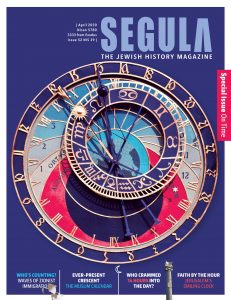Counting the Hours
When did people begin telling time? Many ancient societies divided day and night into units whose length or number varied with the seasons. What advantages did variable-length hours provide, and why did some Judeans prefer a fourteen-hour day? // Eshbal Ratzon
Zionist History by Numbers
How could the third wave of Zionist immigration to Palestine have preceded the second? It all depends on whether Ezra and Nehemiah are considered Zionists, and whether all immigrants count // Hizky Shoham
Eye on the Crescent
What happens when your calendar can change at a moment’s notice because the moon is lost in cloud? Where in the Muslim world can witnesses testify that they’ve seen the new moon? Who’d prefer to calculate the length of Ramadan in advance? And why are leap years useful? // Tehila Bigman
Place in the Sun
Me’a Shearim’s Moshe Shapira channeled his passion for praying at sunrise into a profession, giving Jerusalem its most accurate sundial – “the smiling clock” // Tamar Hayardeni
Read the article in the digital version
A Day at the Museum
Stealing Time
The clocks in Jerusalem’s L. A. Mayer Museum for Islamic Art told revolutionary time, carriage time, and even royal time – until the entire collection disappeared overnight. A visit to time restored // Amit Assis
A Brief History of Time
–
Portrait of a People
Edouard Manet
–
From the Archive
Eliezer Mei-Zahav

